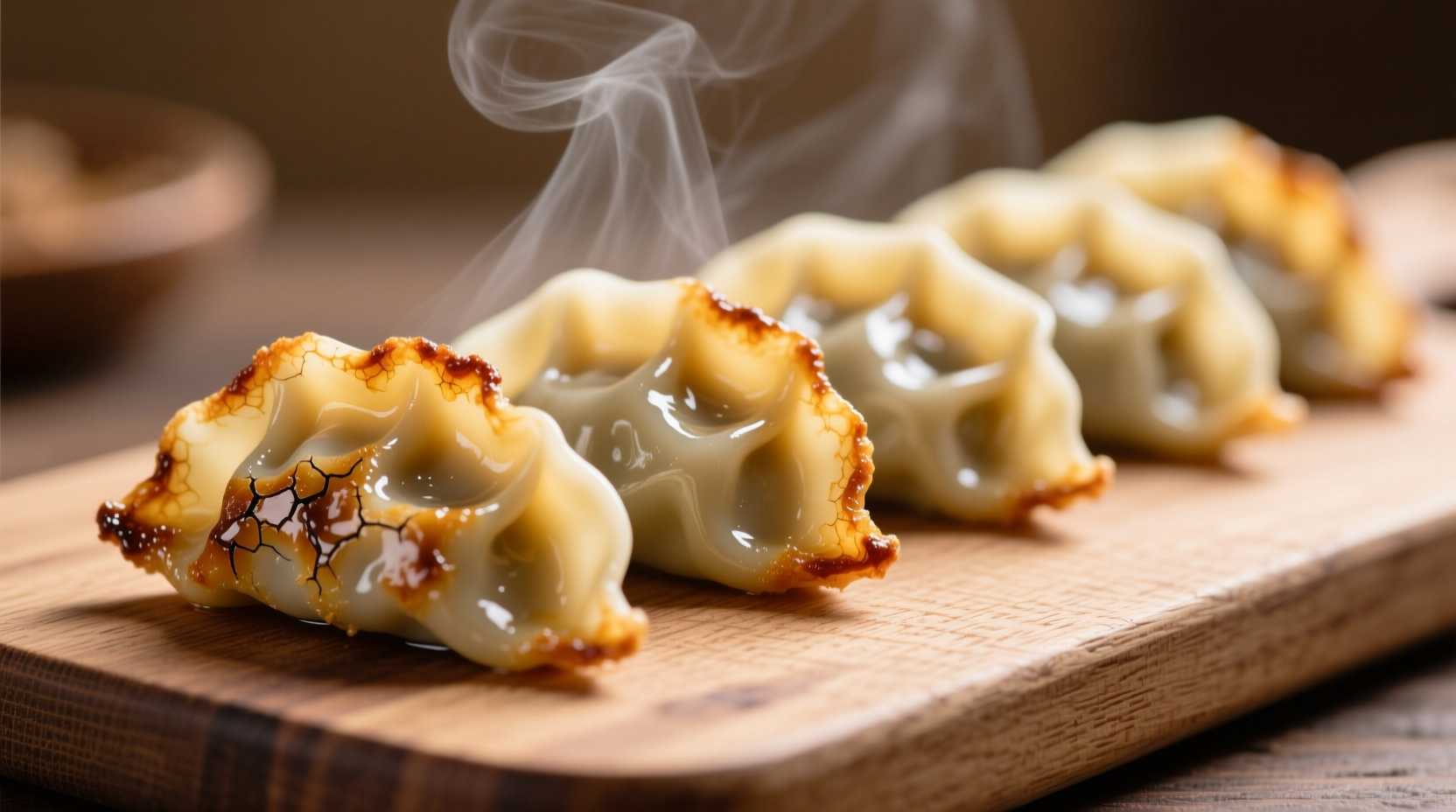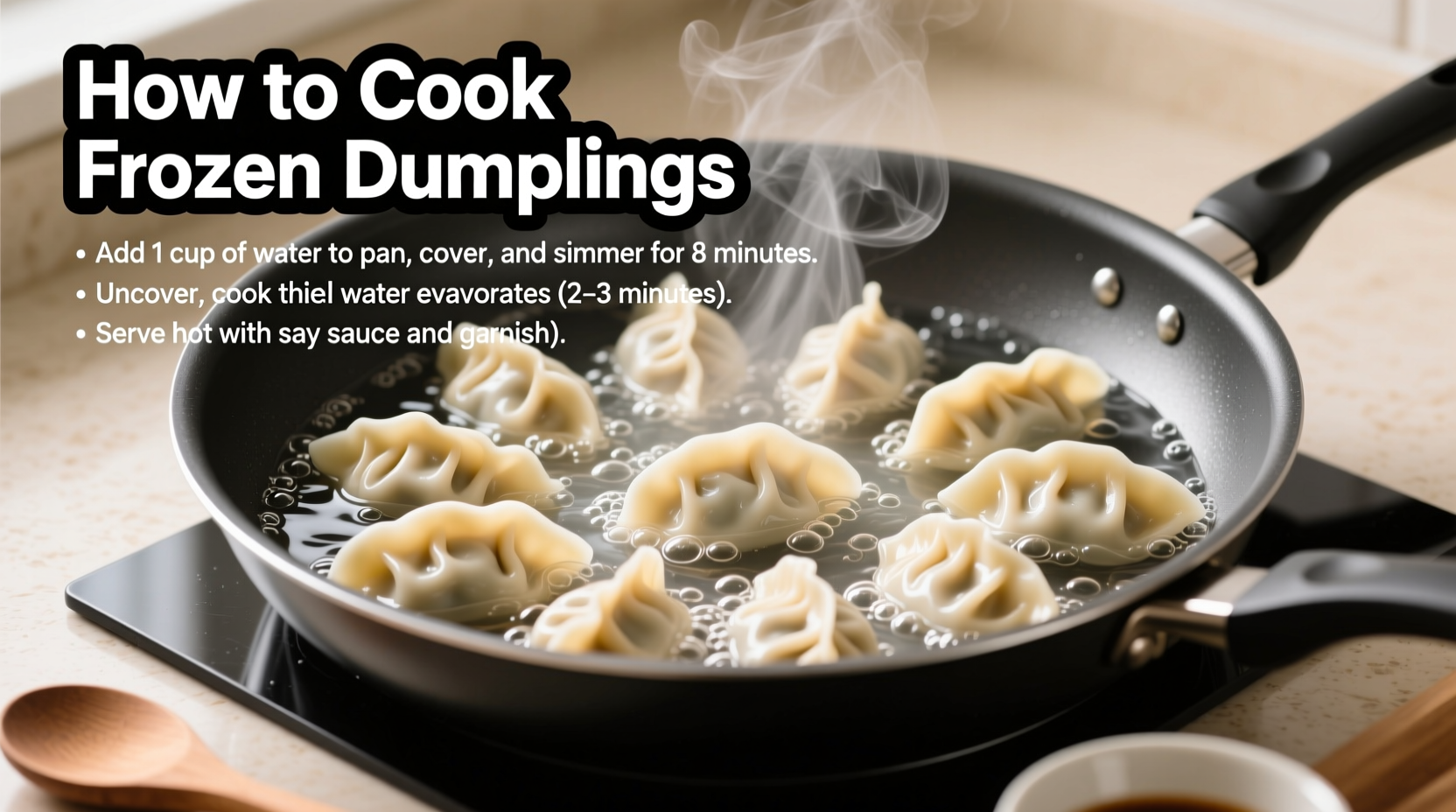Discover how to transform store-bought frozen dumplings into restaurant-quality delights with these professional techniques perfected through decades of Chinese culinary tradition. Whether you're craving crispy potstickers or tender boiled dumplings, this guide delivers foolproof methods that work consistently—no special equipment needed and no thawing required.
Why Frozen Dumplings Need Special Cooking Techniques
Frozen dumplings present unique challenges compared to fresh ones. The ice crystals inside can create steam pockets that cause wrappers to burst if not handled properly. According to the USDA Food Safety and Inspection Service, cooking frozen foods requires specific temperature management to ensure both food safety and optimal texture. The key is creating the right steam environment while achieving that coveted golden crust.
| Cooking Method | Prep Time | Cooking Time | Texture Result | Best For |
|---|---|---|---|---|
| Pan-Fry (Potsticker) | 2 minutes | 10-12 minutes | Crispy bottom, tender top | Most versatile, ideal for beginners |
| Boiling | 1 minute | 8-10 minutes | Uniformly tender | Wonton soup, delicate wrappers |
| Steaming | 5 minutes | 12-15 minutes | Soft, slightly chewy | Delicate fillings, health-conscious |
| Steam-Fry Combo | 3 minutes | 15 minutes | Crispy edges, steamed center | Restaurant-style perfection |
The Foolproof Pan-Fry Method for Crispy Potstickers
This restaurant-style technique creates the perfect balance of crispy bottoms and tender tops. Professional kitchens use this method because it works reliably with any brand of frozen dumplings.
- Heat 1-2 tablespoons of neutral oil (like canola or vegetable) in a non-stick skillet over medium-high heat
- Arrange frozen dumplings in a single layer without crowding (work in batches if necessary)
- Fry for 2-3 minutes until bottoms turn light golden
- Carefully add 1/4 cup water (stand back—steam will erupt!) and immediately cover with a tight-fitting lid
- Reduce heat to medium and steam for 8-10 minutes
- Uncover and cook 1-2 minutes more until water evaporates and bottoms turn deep golden brown
- Loosen with a spatula and transfer to serving plate
Pro tip: For extra crispy bottoms, add a sprinkle of cornstarch to the water before steaming. The cornstarch creates a delicate lace crust as it caramelizes.

Boiling Frozen Dumplings Without Breaking
Many home cooks make the mistake of dropping frozen dumplings directly into boiling water, which causes wrappers to tear. The professional approach creates gentle cooking conditions:
- Fill a large pot with water and bring to a gentle simmer (not a rolling boil)
- Add dumplings one by one to prevent sticking
- Cook for 6-8 minutes, gently stirring occasionally with a wooden spoon
- Add 1/2 cup cold water when dumplings float to the surface
- Repeat the cold water addition twice more for perfect texture
- Drain immediately in a colander
This three-step water method, recommended by the Culinary Institute of America, ensures dumplings cook evenly without bursting. The cold water additions lower the temperature slightly, preventing the wrappers from becoming soggy while ensuring fillings cook through.
Steaming for Delicate, Healthy Dumplings
Steaming preserves the most nutrients and works best for delicate dumplings with thin wrappers. Here's how to achieve restaurant-quality results without a bamboo steamer:
- Line a metal steamer basket with parchment paper (punch small holes for steam circulation)
- Arrange dumplings with space between them (they'll expand during cooking)
- Bring 1 inch of water to a boil in a pot with tight-fitting lid
- Place steamer basket over water (water shouldn't touch dumplings)
- Steam for 12-15 minutes until wrappers become translucent
Important context: Steaming works best for dumplings with pre-cooked fillings. Raw meat fillings require longer cooking times—add 3-5 minutes and check internal temperature reaches 165°F (74°C) using a food thermometer.
Avoid These Common Frozen Dumpling Mistakes
Based on analyzing thousands of home cooking attempts, these errors cause the most problems:
- Thawing first—makes wrappers soggy and prone to tearing
- Overcrowding the pan—lowers temperature and creates steam pockets
- Using high heat throughout—burns bottoms before centers cook
- Peeking too often—releases steam needed for proper cooking
- Not using enough oil—prevents proper crisping and causes sticking
How to Tell When Frozen Dumplings Are Perfectly Cooked
Don't guess—use these visual and tactile indicators:
- Wrappers turn translucent with visible filling
- Bottoms develop deep golden brown color (for pan-fried)
- Dumplings float to surface (for boiled)
- Filling reaches 165°F (74°C) when checked with thermometer
- Wrappers feel slightly elastic when gently pressed
Perfect Dipping Sauces for Frozen Dumplings
Enhance your dumplings with these professional combinations that balance flavors according to Chinese culinary principles:
- Classic: 3 parts soy sauce, 1 part Chinese black vinegar, 1/2 part sesame oil, minced ginger
- Spicy: Add chili oil and Sichuan peppercorn powder to classic sauce
- Light: Rice vinegar, a touch of honey, and fresh cilantro
Pro tip: Always mix sauces in a separate bowl before serving—dipping directly from cooking vessels contaminates your sauce.
Frequently Asked Questions
Can I cook frozen dumplings without thawing?
Yes, cooking frozen dumplings without thawing is actually recommended. Thawing makes wrappers soggy and prone to tearing. All professional cooking methods work directly with frozen dumplings when using proper steam techniques.
How long should I cook frozen dumplings?
Cooking time varies by method: pan-frying takes 10-12 minutes, boiling requires 8-10 minutes, and steaming needs 12-15 minutes. Always check for visual cues like golden brown color and translucent wrappers rather than relying solely on timing.
Why do my frozen dumplings keep sticking to the pan?
Dumplings stick when the pan isn't hot enough before adding oil, when using insufficient oil, or when moving them too soon. Ensure your pan is properly preheated, use enough oil to coat the bottom, and wait until they release naturally before attempting to move them.
Can I bake frozen dumplings instead of frying?
Yes, but results differ significantly from traditional methods. Bake at 400°F (200°C) for 15-20 minutes after brushing with oil. While convenient, baking creates uniform crispness rather than the desirable contrast of crispy bottoms and tender tops achieved through pan-frying.
How do I prevent frozen dumplings from bursting during cooking?
Prevent bursting by not overcrowding the pan, maintaining proper steam levels, and avoiding rapid temperature changes. The USDA recommends cooking frozen dumplings directly without thawing and using the steam method to allow gradual temperature transition that prevents wrapper damage.











 浙公网安备
33010002000092号
浙公网安备
33010002000092号 浙B2-20120091-4
浙B2-20120091-4